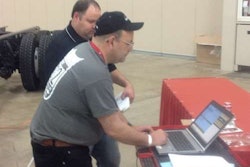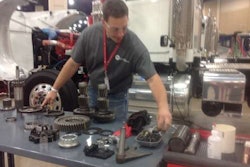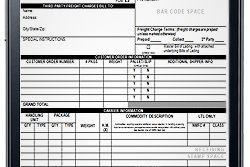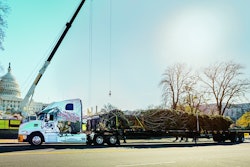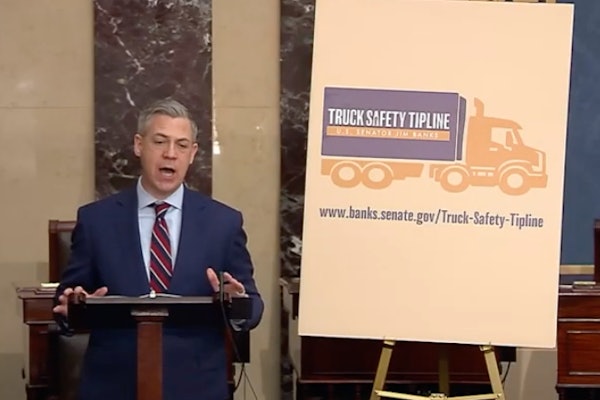President Barack Obama on Monday recognized Detroit Diesel Corp. and its local UAW unit for working together to invest in facilities needed to build the Detroit DT12 automated manual transmission and DD15 proprietary asymmetric turbocharger at the company’s Redford, Mich., operation.
“Today, Daimler is announcing a new $120 million investment into this plant, creating 115 good, new union jobs building transmissions and turbochargers right here in Redford,” Obama said in remarks to a small crowd consisting mostly of UAW members, company management and dignitaries.
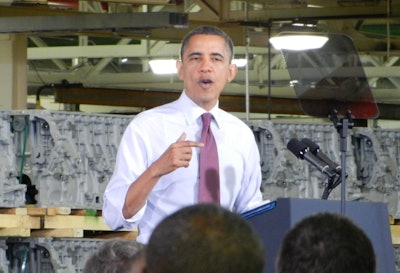 President Obama spoke Dec. 10, 2012, at Detroit Diesel’s Redford, Mich., plant to praise management and unions for coming together to invest in U.S. production of automated transmissions and turbo chargers.
President Obama spoke Dec. 10, 2012, at Detroit Diesel’s Redford, Mich., plant to praise management and unions for coming together to invest in U.S. production of automated transmissions and turbo chargers.Obama spoke Dec. 10, 2012, at Detroit Diesel’s Redford, Mich., plant to praise management and unions for coming together to invest in U.S. production of automated transmissions and turbo chargers.
“That is great for the plant,” Obama continued. “It’s great for this community. But it’s also good for American manufacturing. Soon, you guys will be building all the key parts that go into powering a heavy-duty truck, all at the same facility. Nobody else in North America is doing that.”
Obama’s brief remarks touched on a number of topics, including the auto industry bailout, negotiations over the so-called “fiscal cliff” and, indirectly, new “right-to-work” legislative initiatives in Michigan. “And by the way, what we shouldn’t do — I just got to say this — what we shouldn’t be doing is trying to take away your rights to bargain for better wages and working conditions.”
That comment produced the loudest applause of the speech, beating out a remark later recognizing an employee — known at the plant as “Pretty Willie” — for his 60 years with Detroit Diesel. “Willie started back on December 12, 1952,” Obama noted. “He made $1.40 an hour. The only time he spent away from this plant was when he was serving our country in the Korean War.” For a transcript of President Obama’s complete remarks, click here.
The final decision to build the DT12 and turbocharger in Redford is a recent one. “The point of no return was crossed three weeks ago,” says Martin Daum, president and CEO of Daimler Trucks North America, parent company of Detroit Diesel. That’s when the Daimler board of directors approved the investment regardless of automated transmission sales over the next couple of years.
Some of the keys to Daimler’s commitment to build the transmission and turbo at the existing Detroit Diesel plant included operational and production flexibility from UAW Local 163, economic incentives from the State of Michigan and Redford Township and a large pool of manufacturing workers and engineers, Daum says. Another factor: Daimler doesn’t want the cost of its transmissions and turbochargers for North America tied to foreign currency worries.
Currently, around 60 North American trucks are equipped with demonstration versions of the DT12, and Detroit Diesel plans to introduce the automated manual transmission to the North American market in May 2013 for the DD15 and in November 2013. Initially, Daimler will import the transmissions from its Gaggenau, Germany, plant, which already produces the transmissions. Production at Redford will start at the beginning of 2015. Turbo production will start a bit earlier in the fourth quarter of 2014.
“We looked at a lot of possibilities, but we figured out that Detroit was the best place to do it,” Daum told trucking industry journalists prior to President Obama’s remarks. It was more than just the union agreement, incentives and workforce availability, he added. “Our heart and soul are here.”
Daum noted that he is on a mission to convert the North American market from manual transmissions to automated manual transmissions and that Daimler needs to make this investment to do so.
“I we reach the volumes we have in mind, I can’t import those transmissions,” Daum says. “We don’t want to be an imported truck. We want to be a North American truck.”
Daum acknowledged that Daimler faced a chicken-and-egg dilemma in its decision to commit to domestic production of automated transmissions. Some manufacturers might not invest in production until volumes reached a certain level, but that level would be tough to reach without domestic production. “I think we know what we are doing because we saw the extraordinary results in the area of fuel economy,” Daum said.
Simply exchanging manual transmissions for automated manual transmissions will save 1.5% in fuel compared to an experienced driver operating in a competitive mode, Daum says. Compared to the typical driver operating in typical conditions, the improvement is substantially larger, he says.
But that’s just the beginning, Daum says, adding that automated transmissions allow for deep integration of the transmission with the engine. “We think there’s a huge opportunity.”
If Daum succeeds in winning North American truck buyers to the virtues of automated manual transmissions, what is his next crusade? “Getting North American trucks to 24 volts.”

